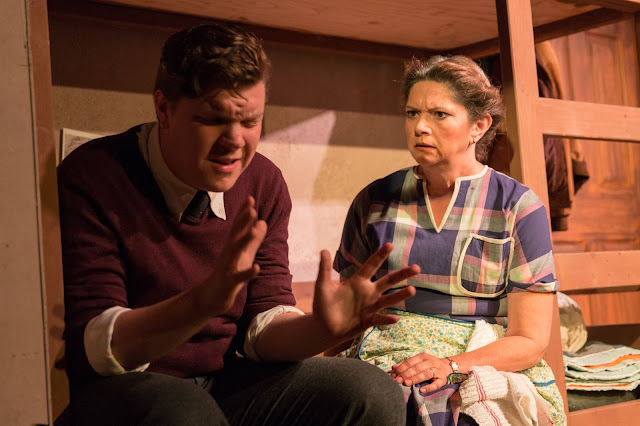When
salmon meets lox
by
Michael Dresdner
 |
| L to R: Drew Bates, Andrew Fox Burden All photos by Tim Johnston |
Lakewood
Playhouse opened their 80th season last night with Brighton Beach
Memoirs, part one of the brilliant autobiographical trilogy by the deservedly
legendary Neil Simon less than two weeks after his passing. It’s a masterpiece
of timing.
By the
time Simon turned his attention to his own childhood memories in this oeuvre,
he had already racked up a string of close to 20 stage hits over as many years,
including Come Blow Your Horn, Barefoot In The Park, The Odd Couple, Plaza
Suite, The Sunshine Boys, Murder by Death, and several others.
 |
| L to R: Andrew Fox Burden, Pamela Roza |
Eugene
Jerome (Drew Bates) is almost 15, not yet recovered from puberty, and living in
a barely middle class Brooklyn household in 1937, a time when war was already
heating up in Europe. Eugene does double duty as the narrator who fills in
details and delivers a stream of comical “observations” about his family, a
technique that mitigates the painfulness of their very tenuous grip on
solvency.
 |
| L to R: W. Scott Pinkston, Andrea Gordon |
His
father, Jack Jerome (W. Scott Pinkston) works two jobs to support his wife Kate
(Pamela Roza), their sons, Eugene and his 18-year-old brother Stanley (Andrew
Fox Burden), Kate’s younger and more timid sister Blanche (Brynne Garman), and
her two daughters, the beautiful 16-year-old Nora (Andrea Gordon) and her
13-year-old sister Laurie (Kate-Lynn Siemers), who has a heart flutter but is
treated like far more of a delicate flower than she really is. Blanche lost her
husband six years earlier to cancer (a word no one says in anything but a
whisper lest uttering it would bring it on) and is completely dependent on the
largess of her sister’s family. They all live crammed together in a small house
where they must be constantly on top of one another.
At the
opening of the play, Jack has lost one of his two jobs, and son Stanley, the
only other wage earner of the bunch, is on the cusp of losing his. It’s just
the first of any number of calamities,
mostly financial, that befalls the stalwart tribe, but they always manage to
pull together and soldier on. The glue that binds them is a deep and real
familial love, something strong enough to overcome whatever comes.
Meanwhile,
Eugene is grappling with his lust for his cousin Nora, the dark secret of teen
masturbation, and his dual desires to be a baseball player and a writer.
Throughout, he’s fed a scattering of sage sexual advice by his slightly more
aware older brother, confidant, and role model Stanley.
 |
| L to R: Pamela Roza, Brynne Garman |
Although
the males take much of center stage, the best scene, and the most authentic
character portrayals, comes during act two, when sisters Kate and Blanche have
it out. The argument dredges up all the long-suppressed resentments of
childhood, from the common “mom always liked you best” issue, to the unyielding
unfairness of being the older/younger sibling. Kudos to Roza and Garman for
making that scene truly sparkle.
The set,
by director John Olive with props by Karrie Morrison, was large, complex, and
quite appropriate, though I have seen better paint jobs from past Lakewood
teams. Lighting by Michalyn Thomson was bright and clear, but I would have
liked to have seen it used for more delineation. For example, there are times
when Eugene verbally (not physically) “steps away” from the action to narrate,
and dim lights and a spot on him would have made those transitions more crisp.
Costumes,
by Rachel Wilkie were right on target for both the characters and the time
period, and if you like that period’s music, which I do, you’ll love the sound
design by Artistic Managing Director John Munn.
My
biggest issue with this play is how much it depends on a deep understanding of
the culture it portrays. Simon peels back the veneer of classic Jewish angst to
expose a very specific, and very common, family dynamic. However, though it is
in English, he expresses it through the unique rhythm and musicality of Yiddish
jargon. That may sound easy, but it’s rather elusive for West coast ears.
Mind
you, there’s nothing wrong with salmon, but it’s not lox. Though this
undoubtedly sounds effete and petty, for someone who grew up as part of that
culture, this rather goyisha take on Simon comes off a bit like an all-white
version of Raisin in the Sun.
Still,
that hairsplitting is probably lost on most patrons, and to be sure, the
opening night audience definitely found this both funny and delightful. My
guess is that you will too.
Brighton
Beach Memoirs
Sept. 7
to 30 2018
Lakewood
Playhouse
No comments:
Post a Comment